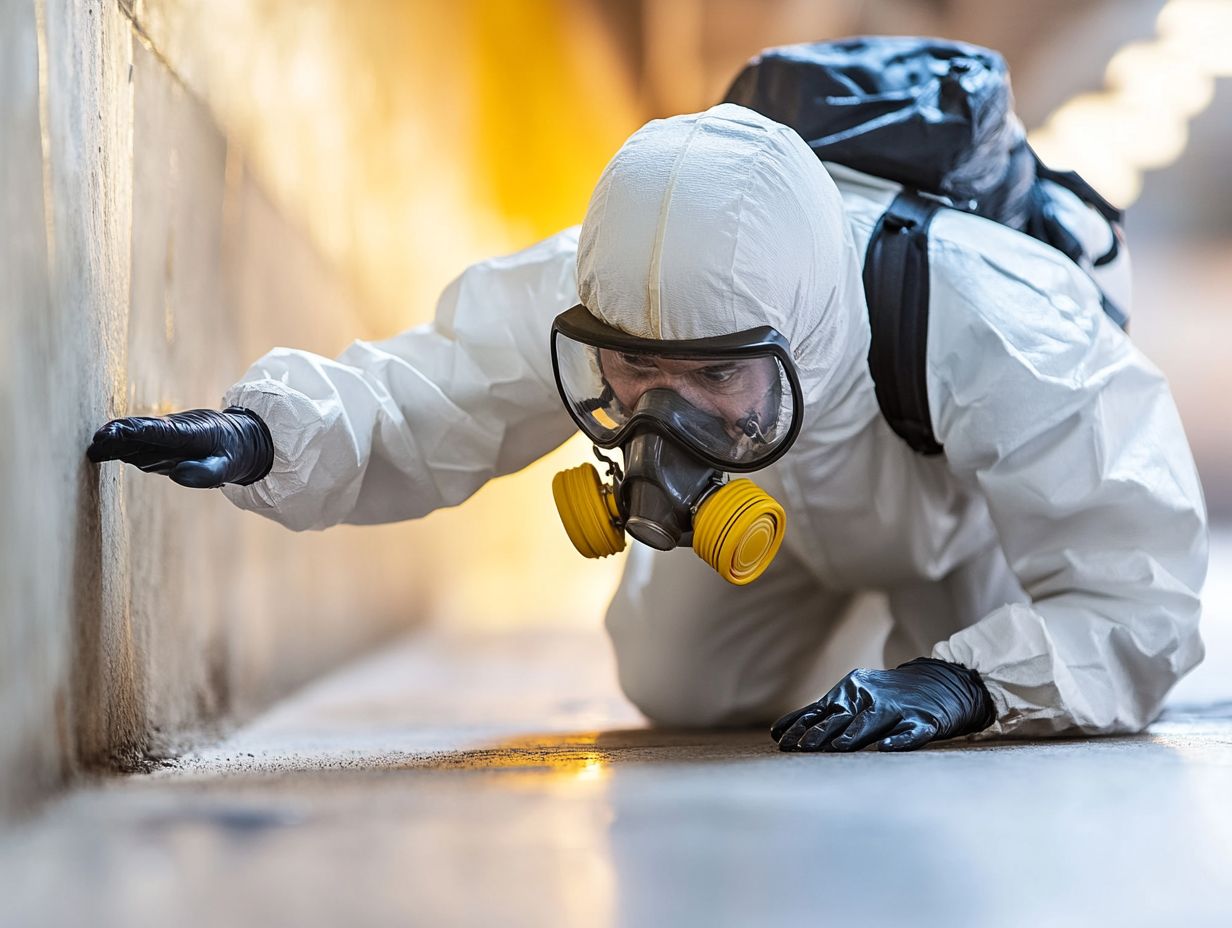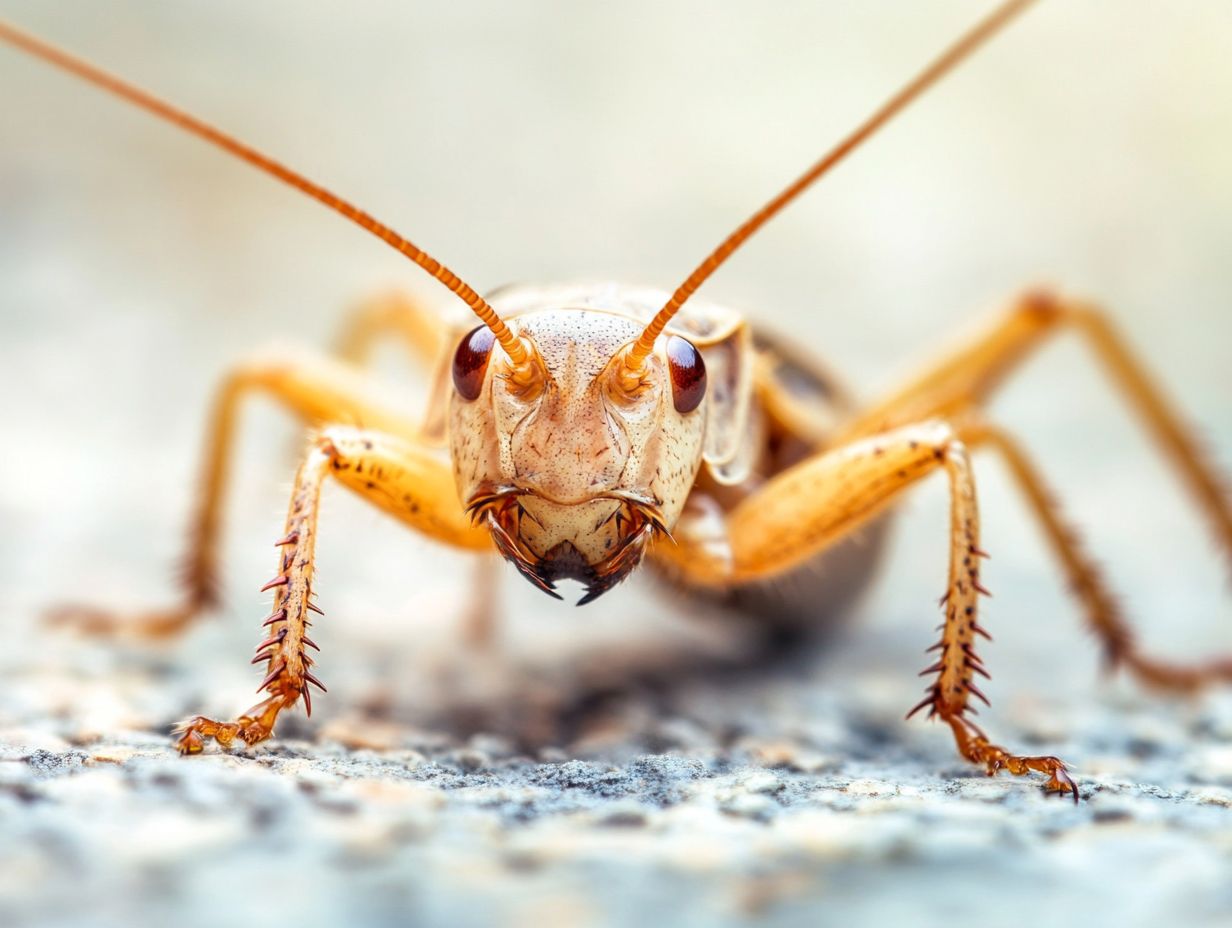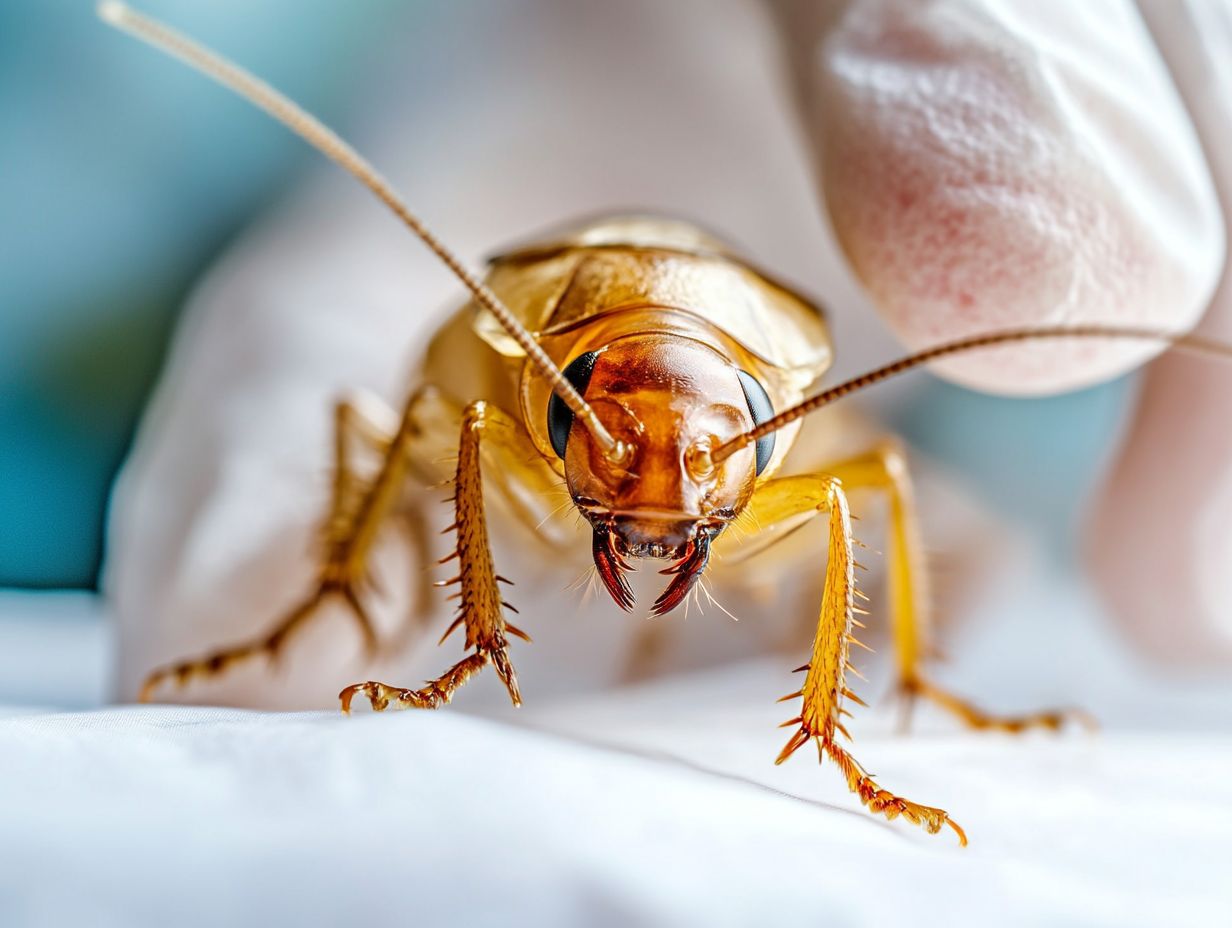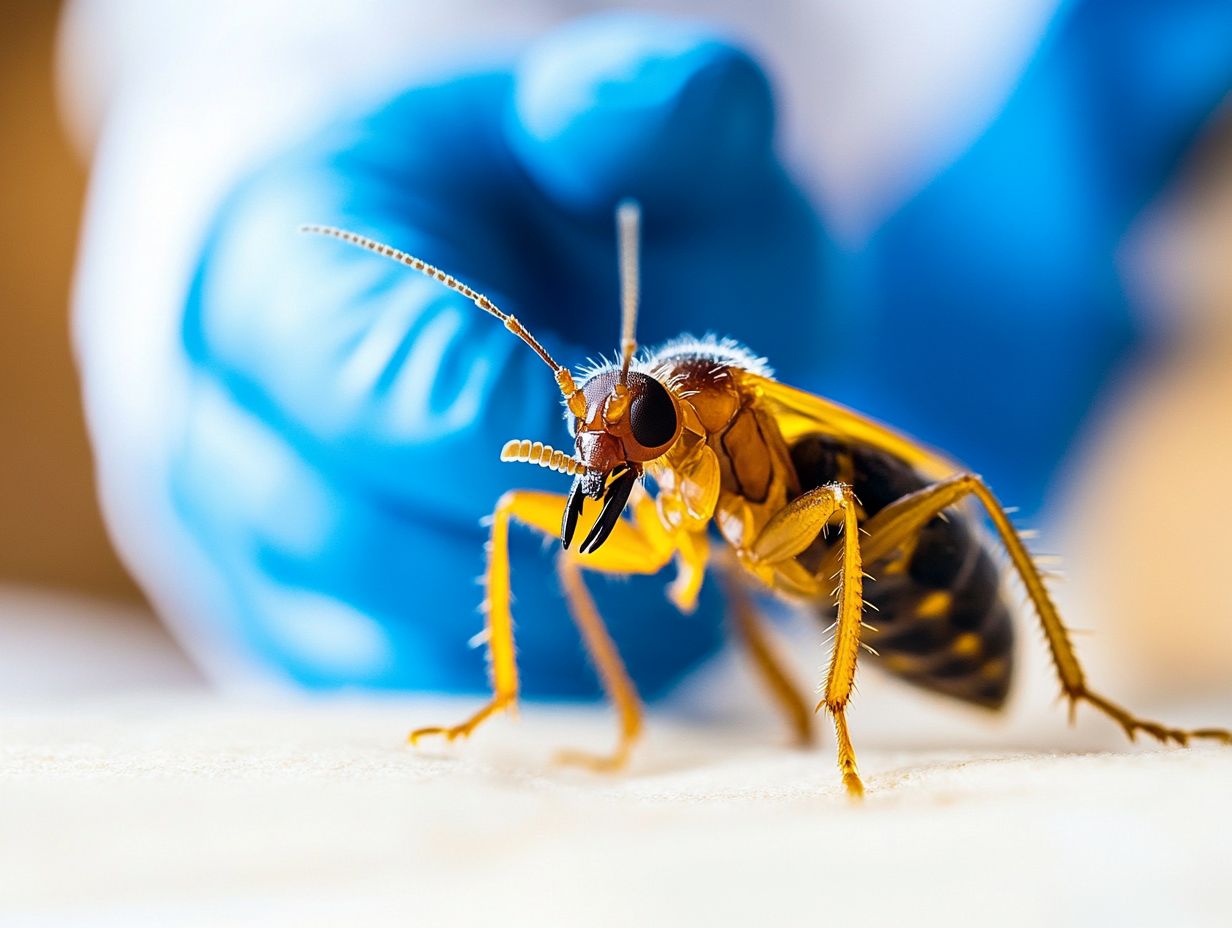Pest control isn’t just about keeping those little critters away; it’s crucial for maintaining your business's reputation, complying with health regulations, and ensuring a safe work environment.
From rodents to insects, various pests can be a real threat to your property and brand image. Let’s dive into why pest control matters for your business, the types of pests you might encounter in commercial spaces, and some effective ways to prevent and manage these unwelcome visitors.
You'll discover how to protect your business and create a healthier workplace for everyone.
Why is Pest Control Important for Businesses?

Pest control is super important for your business because it directly affects your reputation, safety, and efficiency. If you let pests stick around, you could face major operational disruptions, health violations, and damage to your property and brand image.
By putting effective pest management strategies in place, you’re not just following health regulations; you're also protecting your customers' safety and keeping your workspace clean.
When you understand how crucial pest prevention is, you can tackle potential issues before they turn into full-blown infestations, creating a safe and welcoming environment for both your employees and clients.
1. Protects Reputation and Brand Image
Protecting your reputation and brand image is a key reason to invest in pest control. Just one pest sighting can snowball into negative reviews, lost customers, and even potential legal troubles.
Take restaurants, for example. They're under constant scrutiny from both customers and health inspectors; even a small pest problem can trigger a wave of negative online comments, which can seriously damage trust and drive away foot traffic. Retail stores are no different. If customers spot rodents or insects, they might think twice about shopping there, tarnishing the brand’s reputation in the process.
And let’s not forget about the bigger picture. Prolonged infestations can create serious risks to customer safety, leading to even worse consequences. By putting effective pest identification and prevention strategies in place, you not only reduce these risks but also show your clients that their well-being matters to you. This can help build loyalty and keep your brand image shining bright.
2. Ensures Compliance with Health and Safety Regulations
Ensuring compliance with health and safety regulations is crucial for any business, especially if you’re operating in commercial properties. Effective pest control is key to sticking to local health regulations designed to protect your employees and customers from the health risks posed by pests.
You need to familiarize yourself with the various legal and regulatory frameworks that govern pest management practices. These regulations set the standards for pest control methods and require regular inspections and reporting to keep your compliance on point.
Adopting an integrated pest management (IPM) approach not only helps you tackle pest issues effectively but also shows that you’re committed to maintaining a safe and healthy environment. By making pest management a priority in your overall compliance strategy, you can reduce the risk of fines and ensure the well-being of your workforce and customers. In the end, this leads to better operational stability and boosts your reputation.
3. Prevents Damage to Property and Equipment
Preventing damage to your property and equipment is a key part of pest control that you definitely shouldn't overlook. Pests like rodents and termites can wreak havoc, causing serious structural damage and leading to some pretty hefty repair bills if you don’t tackle the issue quickly.
And it's not just those well-known troublemakers—bugs like carpenter ants and cockroaches can also create major headaches when it comes to safety and sanitation. Understanding how pests behave is crucial for managing your property; catching them early can really help minimize their impact, keeping your business running smoothly and your facilities in top shape.
Regular inspections and treatments are not just about stopping infestations; they can also help extend the lifespan of your essential equipment and infrastructure. By investing in proactive pest management strategies, you can protect your assets and create a welcoming environment for both clients and employees.
4. Maintains a Healthy and Safe Working Environment
Maintaining a healthy and safe working environment is crucial for boosting your employee morale and productivity. By implementing effective pest control and sanitation practices, you can prevent pest infestations and create a safe space for everyone.
These measures don't just create a pleasant atmosphere; they also help you comply with essential health regulations that protect your team. When you prioritize pest prevention strategies alongside thorough sanitation protocols, you're effectively minimizing risks that could jeopardize your workforce's well-being.
Regular inspections and thorough cleaning routines are key here. They help foster an environment where your employees can focus on their tasks without the distraction of pests. In the end, companies that embrace these practices are not only safeguarding their employees' health but also enhancing overall operational efficiency.
Types of Pests in Business Settings
It's essential for you to understand the types of pests that commonly show up in business settings if you want to develop effective pest control strategies.
Different pests, like rodents, insects, and termites, can create various challenges for your commercial property, affecting both sanitation and the safety of your customers.
1. Rodents
Rodents, like mice and rats, are some of the most common nuisance pests you’ll encounter in business settings. They’re notorious for their destructive habits and astonishing ability to multiply quickly. You definitely want to keep them at bay because they can contaminate food and spread diseases, posing serious risks to both property and health.
Having these little critters around can lead to costly damages, damage your reputation, and ultimately cut into your profits. In places like restaurants and warehouses, a rodent infestation can really throw a wrench into operations and could even land you hefty regulatory fines.
To tackle rodent populations effectively, it’s crucial for you to prioritize pest identification. Knowing which species you’re dealing with and understanding their habits will give you a leg up. Implementing comprehensive pest control measures—like sealing up entry points and sticking to strict sanitation protocols—will go a long way in preventing an infestation.
Regular inspections and teaming up with professional pest management services can significantly lower your risk of encounters with these unwanted guests, helping to keep your workplace healthier and more productive.
2. Insects
Insects can be a real headache for your business, with various critters like ants, cockroaches, and bed bugs threatening both hygiene and customer satisfaction. That’s why effective insect management is crucial to prevent those pesky infestations.
These pests don’t just mess up the cleanliness of your space; they can also lead to some serious losses in revenue and damage to your reputation. You’ve got to stay on your toes because certain insects, like termites, can wreak havoc on your structure, while others might carry diseases that put both your staff and customers at risk.
Implementing solid pest control strategies, like regular inspections and proactive prevention measures, is key. By getting to know the common behaviors of these insects and where they like to hang out, you can make your establishment a less appealing place for them. This way, you’ll enhance overall hygiene and create a safe, welcoming atmosphere for everyone.
3. Birds

Birds like pigeons and sparrows can really be a nuisance in commercial properties. They can cause damage to your structures and create unsanitary conditions with their droppings. That’s why it’s super important to implement effective bird control measures to tackle these issues head-on.
But it’s not just about how things look—having these birds around can lead to serious financial losses. You might see property degradation and face potential health risks from pathogens in their waste. If you’re a business owner who overlooks pest control, you could end up with higher maintenance costs and negatively affect employee morale and customer satisfaction.
That’s why it’s crucial for you, as a property manager or business owner, to understand the importance of proactive bird management strategies. Keeping a clean and safe environment is a priority for everyone involved.
By using professional pest control services tailored to the challenges birds pose in commercial settings, you can protect your assets and boost your reputation.
4. Termites
Termites have quite the reputation for wreaking havoc on wooden structures in business settings, so it’s crucial for you to stay on top of regular termite inspections and effective pest treatments for property management.
These relentless pests can sneak in and quietly undermine the integrity of your building, which can lead to some hefty repair bills and disruptions down the line. For businesses like yours, the stakes are high, and having a solid pest management strategy is key. By scheduling timely inspections, you can catch potential infestations before they spiral out of control.
Using a mix of pest treatment methods—from baiting systems to targeted chemical applications—will help you protect your assets. Investing in proactive measures not only keeps your structures safe but also builds confidence with your clients, which is essential for maintaining a strong reputation in this competitive market.
How to Identify and Assess Pest Infestations in Your Business
Identifying and assessing pest infestations in your business is the first step to effective pest control. By keeping an eye on things and understanding how pests behave, you can spot early signs of infestations and take action before they get out of hand.
Regular monitoring is key!
1. Conduct Regular Inspections
Conducting regular inspections is a smart way to stay ahead in pest control. It helps you spot potential issues before they turn into full-blown infestations. Focus your inspections on areas that pests love to invade, like storage rooms and kitchens.
Don’t forget to pay attention to outdoor perimeters, attics, and basements during your evaluations, too. These places are just as important when it comes to keeping pests at bay.
By making pest monitoring a regular routine, you can start to notice patterns in pest behavior that might hint at bigger problems lurking around. It’s not just about searching for obvious signs; picking up on subtle cues and changes in your environment can give you valuable insights into potential infestations.
For example, checking for entry points or food sources can really boost your pest control strategy, helping you keep those unwanted guests out of your space.
2. Look for Signs of Pest Activity
Looking for signs of pest activity is essential for catching infestations early. Common indicators you should keep an eye out for include droppings, gnaw marks, and nests—these can all signal the presence of annoying pests in your space.
By recognizing these telltale signs, you can take proactive steps to tackle infestations before they spiral out of control. For example, noticing specific pest behaviors can give you clues about what kind of infestation you're dealing with, whether it’s rodents or insects.
If you find shredded paper, that might suggest they’re looking for nesting materials, while distinct trails or tunnels could indicate the movement patterns of pests like ants or mice.
Spotting these signs not only helps you identify the culprits but also ensures you can use the right pest control methods, leading to more effective and targeted solutions.
3. Determine the Extent of the Infestation
Determining the extent of a pest infestation is crucial for you to develop an effective pest treatment plan. This means assessing the level of damage, counting the number of pests hanging around, and identifying the areas they’re affecting.
When you conduct a thorough pest risk assessment, you get valuable insights into the specific types of pests involved and the potential risks they pose to both your property’s structural integrity and your health. This assessment usually includes checking for potential entry points, spotting any conditions that might attract pests, and evaluating how well any previous pest control measures have worked.
Understanding the details of the infestation allows you to create a tailored pest treatment strategy that tackles the root causes instead of just putting a band-aid on the problem. Plus, incorporating regular assessments into your maintenance routine ensures that any new pest threats are quickly identified and managed, keeping your space safe from future infestations.
Methods of Pest Control for Businesses
Understanding the different methods of pest control available for your business is key to effective pest management. You have options like chemical, biological, and physical control, each of which can be customized to tackle the specific pest problems you might face.
1. Chemical Control
Chemical control means using insecticides and other chemicals to get rid of pests, and it's a pretty common method in the pest control industry. While it can be effective, you need to prioritize chemical safety to keep both your employees and customers safe.
Relying on chemical pest treatments has its perks, like quickly eliminating infestations, which can save you a ton of time and resources. But these methods also come with some risks, such as potential harm to non-target species and negative impacts on the environment. That's why it's super important to follow strict safety regulations to reduce these dangers.
Making sure that applicators receive proper training is key. This helps ensure that pest control measures are applied safely and effectively, which minimizes exposure to harmful substances. By balancing all these factors and sticking to best practices in chemical safety, the pest control industry can thrive while also protecting public health and the environment.
2. Biological Control

Biological control is all about using natural predators or parasites to keep pest populations in check, and it’s a fantastic eco-friendly alternative to the usual pest control methods. If you're a business looking for sustainable pest management solutions, this approach is definitely gaining traction.
By fostering a balance in the ecosystem, you can cut down on the need for synthetic chemicals and reduce the risks tied to chemical residues. Some effective pest control techniques you might consider include:
- Introducing ladybugs to manage aphid populations
- Using parasitic wasps to target caterpillars
These methods show just how well eco-friendly pest solutions can fit into agricultural practices, offering long-term perks like enhanced biodiversity and healthier soil. By embracing these natural alternatives, your company can create a more resilient pest management strategy, ultimately helping build a healthier environment for future generations.
3. Physical Control
Physical control methods involve using barriers, traps, and other devices to keep pests out of your business premises. This approach can be super effective for managing pest problems while also cutting down on chemical use.
By strategically putting up these physical barriers, you can deter pesky insects and rodents from sneaking into your space, which significantly lowers the chances of infestations. The real power of these pest management systems is in how they create an unwelcoming environment for pests, so it’s essential to take a good look at entry points and vulnerable areas in your building.
Using traps designed for specific pests not only helps you gain immediate control but also gives you valuable insights for ongoing monitoring. Plus, investing in quality pest control products can really boost these strategies, helping you maintain a pest-free zone and create a healthier workspace in the long run.
Preventative Measures for Pest Control in Businesses
You really can't underestimate the importance of implementing preventive measures for pest control if you want to keep your business free from infestations. By prioritizing sanitation practices and being proactive with your strategies, you can greatly reduce the chances of facing any pesky pest problems.
1. Proper Sanitation and Hygiene Practices
Proper sanitation and hygiene practices are your best friends when it comes to preventing pesky infestations, especially in the food industry. Sticking to strict sanitation protocols is crucial for keeping food safe and minimizing what attracts pests.
You should set up regular cleaning schedules that pay attention to both the high-touch surfaces and those hidden spots where pests could be hiding out. For instance, if you make sure that kitchen equipment, countertops, and storage areas are cleaned thoroughly and frequently, you’ll significantly cut down on pests finding their next meal.
Using proper waste management techniques, like sealed bins and regularly tossing out trash, helps keep your environment uninviting for those unwanted visitors. Plus, combining these practices with pest control measures will boost your overall effectiveness. This way, you not only meet safety regulations but also protect your reputation and your customers from the risks that come with pest-related contamination.
2. Regular Maintenance and Repairs
Regular maintenance and repairs are key to preventing pest problems in commercial settings. By addressing leaks, sealing entry points, and keeping up with infrastructure maintenance, you can significantly reduce the risk of pest infestations.
This proactive approach doesn’t just protect your property; it also boosts your overall property management strategies. Implementing a solid pest management plan requires you to stay on top of things and make timely interventions, which can stop potential infestations from getting out of hand. By creating a routine that focuses on pest prevention, you’ll be ensuring a healthier environment for both your employees and clients.
Regular inspections and maintenance routines help you spot any vulnerabilities that pests might take advantage of, helping to preserve the integrity of the structure and the well-being of everyone inside. Ultimately, if you make preventative maintenance a cornerstone of your property management approach, you’ll create a more resilient and pest-free atmosphere for your business.
3. Implementing Pest-Proofing Strategies
Implementing pest-proofing strategies is a smart way to secure your business against potential pest invasions. It’s all about taking proactive steps to block entry points and minimize things that attract pests.
By focusing on pest exclusion and putting together a solid pest control plan, you can really cut down the chances of an infestation. Start by giving your premises a thorough inspection, sealing up any cracks and gaps in walls, windows, and doors to keep pests from sneaking in. Make sure the outside areas are clean and well-maintained, since debris and clutter can be a welcome mat for unwanted visitors.
Regular inspections and maintenance routines will help create a pest-proof environment and encourage a culture of cleanliness among your employees. Working with professional pest management services can also be a game-changer, offering ongoing support and expertise to spot any potential threats. This way, you can ensure that your pest-proofing measures stay effective over time.
Choosing a Professional Pest Control Service for Your Business
Choosing a professional pest control service is a big deal for any business like yours that wants to tackle pest issues effectively. When you team up with experienced pest control companies, you gain access to customized solutions and the know-how that comes with commercial pest management.
1. Research and Compare Companies
Researching and comparing pest control companies is a key step in finding a service that fits your business needs. You'll want to consider factors like service quality, pest control pricing, and customer service when weighing your options.
To kick things off, gather recommendations from trusted sources or check out online reviews to help narrow down your choices. Once you have a list, dive into each company’s website to learn more about their services and specialties. Pay close attention to the pest control methods they use, especially if eco-friendly options are something you care about.
Don’t hesitate to reach out to their customer service team; this can give you a good feel for their responsiveness and willingness to answer your questions. Comparing pest control pricing is also super important, so be sure to request detailed quotes and ask about any hidden fees that might catch you off guard.
Making informed decisions will help ensure you choose a company that not only fits your budget but also delivers top-notch pest management solutions.
2. Check for Proper Licensing and Certification

Making sure the pest control service you choose has the right licensing and certifications is super important for compliance and quality assurance. It guarantees that the professionals handling your pest issues know what they’re doing and can do it safely and effectively.
When you check those pest control certifications, you’re not just keeping your space free of unwanted critters; you’re also looking out for the health and safety of your employees and customers. Licensed services usually have to follow regulations that require them to use approved methods and environmentally friendly practices, which can really cut down on potential hazards.
If you skip checking these credentials, you might end up with shoddy solutions that could land you in legal hot water and put the community at risk.
So, taking the time to verify those essential qualifications shows you’re committed to safety and helps ensure you get reliable and effective pest management results.
3. Inquire about Pest Control Methods and Products Used
When you're looking into pest control services, it's essential to ask about the methods and products they use. You want to make sure they fit with your business's safety and environmental standards. Understanding their approach can really help ensure your customers stay safe and satisfied.
It's also important to think about how their pest treatment methods affect not just the immediate pest problems but also the long-term health of the environment. Many companies nowadays offer eco-friendly pest solutions that tackle infestations effectively while also reducing harmful effects on nearby habitats and human health.
By chatting with service providers about their practices, you can make informed decisions that prioritize sustainability and create a safer environment for both your customers and employees. Plus, ensuring that your pest control strategies are eco-conscious can boost your company’s reputation and show your commitment to corporate responsibility.
Frequently Asked Questions
What is pest control for businesses?
Pest control for businesses is the process of managing and preventing pest infestations in commercial or industrial settings. This includes identifying and eliminating pests, as well as implementing preventive measures to avoid future infestations.
Why is pest control important for businesses?
Pest control is important for businesses because pests can cause major damage to property, products, and reputation. They can also pose health and safety risks to employees and customers, and can result in financial losses and legal issues.
What are the common pests that businesses face?
The most common pests that businesses face include rodents, cockroaches, ants, termites, bed bugs, and flies. However, the specific types of pests can vary depending on the industry, location, and other factors.
What are the methods used in pest control for businesses?
The methods used in pest control for businesses include physical techniques such as trapping and exclusion, chemical treatments like insecticides and pesticides, and non-toxic solutions like heat treatments and biological controls. The best approach will depend on the type of pest and the severity of the infestation.
Can businesses do their own pest control?
While some businesses may attempt to do their own pest control, it is highly recommended to hire a professional pest control company. These experts have the knowledge, experience, and proper equipment to effectively and safely handle pest infestations in a business setting.
How can businesses prevent pest infestations?
Businesses can prevent pest infestations by maintaining a clean and sanitary environment, sealing any entry points for pests, implementing proper waste management practices, and scheduling regular pest inspections and treatments. It is also important to educate employees on ways to prevent and report pest sightings.

